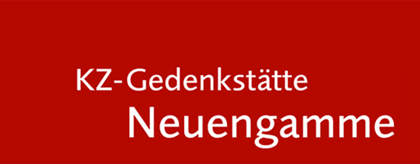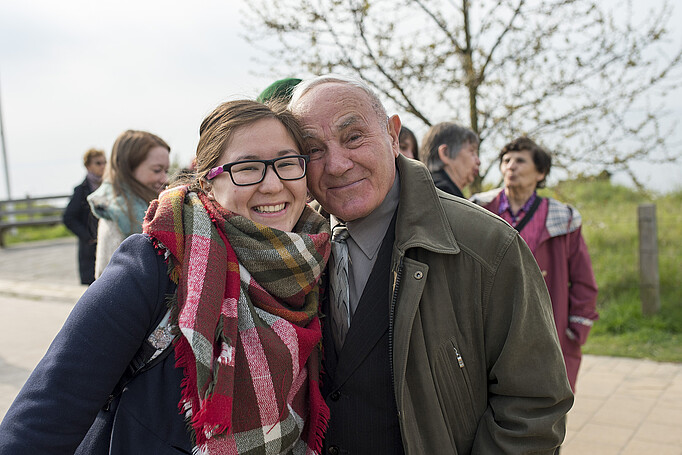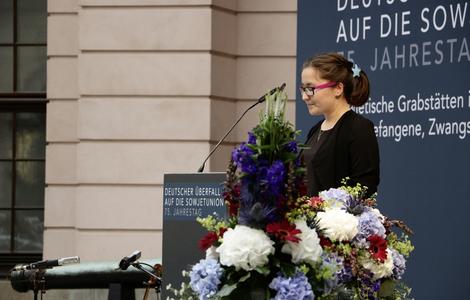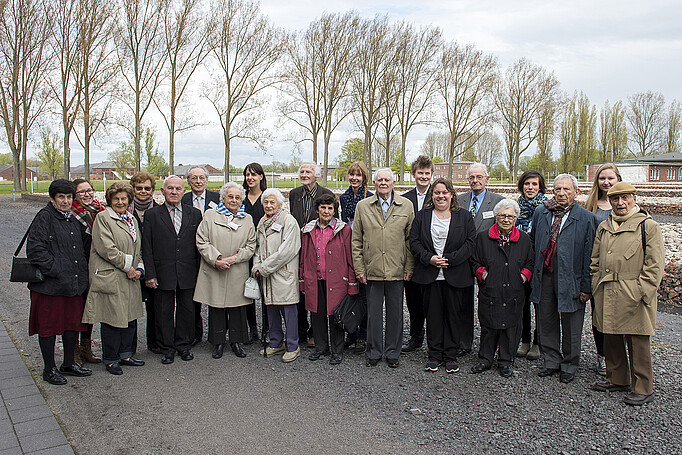09/05/2016 Report
Viktoria Kutdusova: “A year filled with experiences of a lifetime”
On September 1, 2015, a plane from Perm, Russia landed in Berlin Schönefeld. A young girl with two huge suitcases got off, not knowing what was awaiting her. At that moment, she was thinking about her future work at the Neuengamme Concentration Camp Memorial, where she was expecting to broaden her knowledge on the German culture of remembrance and collect interesting material for her future academic work.
A year has passed and I can say now that this voluntary project with Aktion Sühnezeichen Friedensdienste (Action Reconciliation Service for Peace) has meant much more to me than just dealing with German history. Encounters and personal correspondence with concentration camp survivors, former forced workers and others who survived the time of National Socialism, especially the ones from the former Soviet Union, have played an important role. These people had believed there could be nothing worse than Nazi concentration camps, but experienced more atrocities upon their return to their homeland. The Soviet government sent them to Siberia. Friends and relatives turned their backs on them. Their suffering sank into oblivion and remained forgotten for many years. This marginalization resulted in a trauma which has affected their daily lives to this day.
Jevgenij Malychin, a former prisoner of the Neuengamme concentration camp, survived the bombing of the Cap Arcona ship by the British air force. He often talks about the ten hours he spent in the icy water, holding onto a wooden boat. At the end of his story, he always says: "I still do not understand how I survived. How?" This year, only three survivors from the countries of the former Soviet Union came to Neuengamme in order to be present at the commemorative ceremony. They come every year despite the exhausting trip and they keep refusing our offer to use wheelchairs. As soon as they get off the plane, they ask: "Where is Wowa, where is Tanja? They were here last year!". And after a few hours, we go to see Tanjas and Wowas - a meeting they have been looking forward to for a whole year.
In the course of this year, I've visited more than seven concentration camp memorials and been to more than a dozen events and lectures dealing with National Socialism. In this regard, my expectations considering my project were completely fulfilled. A particularly interesting experience was my visit to the site of the former gunpowder factory in Libenau. Thanks to the initiative of Martin Guse and volunteers from Libenau and Belarus, an international youth exchange project entitled "Learning from the Past" took place. Approximately 40 young people from Poland, Ukraine, Belarus and Germany participated in the project and talked about racism and discrimination. The highlight of the program was the meeting with a former prisoner from Ukraine, Karl Ivanovich Pajuk, whom we all know from Neuengamme.
A year ago, I could not have imagined that a true friendship could develop out of a simple correspondence with Karl Pajuk, a survivor of the "Arbeitserziehungslager" (literally work education camp) Libenau and the Neuengamme concentration camp. We met in Hamburg, we laughed and cried together. He talked in Ukrainian, I answered in Russian. We sang, danced, hugged and made jokes. As we were saying goodbye in May, we were already friends. I was encouraging him to come again next year. He looked doubtful - will he be able to make it?
"A year filled with experiences of a lifetime", this is how I would summarize my time in Germany. I've met new people, learned and experienced many things, I've traveled, been mesmerized and delighted and seen life and death. Due to this project, I've met selfless and courageous people who have taught me to overcome crises and to act despite difficulties and help those around me. The project has taught me to think.
My interest in the history of the world and different cultures, especially the history of my own family was awaken. In the past year, I've spent a lot of time in the archives and found documents about my great-grandfather who fought in the war. During my trip to Poland with the other ASF volunteers, I found a cemetery for Soviet prisoners of war. My great-grandfather's brother was buried there. He died at the age of twenty, five months before the end of the war, after he had fought for the liberation of Poland.
It is important for me to keep working in the field of the culture of remembrance and continue my engagement in Russia. What is also very important for me personally is to continue fighting hate and discrimination against minority groups, in order to make the world a little more peaceful and free.
Report from Viktoria Kutdusova



